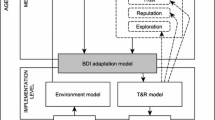Abstract
In many dynamic open systems, agents have to interact with one another to achieve their goals. Here, agents may be self-interested, and when trusted to perform an action for another, may betray that trust by not performing the action as required. In addition, due to the size of such systems, agents will often interact with other agents with which they have little or no past experience. There is therefore a need to develop a model of trust and reputation that will ensure good interactions among software agents in large scale open systems. Against this background, we have developed TRAVOS (Trust and Reputation model for Agent-based Virtual OrganisationS) which models an agent’s trust in an interaction partner. Specifically, trust is calculated using probability theory taking account of past interactions between agents, and when there is a lack of personal experience between agents, the model draws upon reputation information gathered from third parties. In this latter case, we pay particular attention to handling the possibility that reputation information may be inaccurate.
Similar content being viewed by others
References
Buchegger S., Boudec, J.Y.L. (2003). A robust reputation system for mobile ad-hoc networks ic/2003/50. Technical report, EPFL-IC-LCA.
DeGroot, M., & Schervish, M. (2002). Probability & statistics (3rd edn.). Addison-Wesley.
Dellarocas, C. (December 2000). Mechanisms for coping with unfair ratings and discriminatory behavior in online reputation reporting systems. In Proceedings of the 21st International Conference on Information Systems, (pp. 520–525). Brisbane, Australia.
Denison, D. G. T., Holmes, C. C., Mallick, B. K., & Smith, A. F. M. (2002). Bayesian methods for nonlinear classification and regression. Wiley.
Foster, I., Jennings, N. R., & Kesselman, C. (July, 2004). Brain meets brawn: Why grid and agents need each other. In Proceedings of the 3rd International Joint Conference on Autonomous Agents and Multi Agent Systems (pp. 8–15). New York, USA.
Gambetta, D. (1988). Can we trust trust? In Gambetta, D. (Ed.) Trust: Making and breaking cooperative relations, (Chapter 13, pp. 213–237). Basil Blackwell. Reprinted in electronic edition from Department of Sociology, University of Oxford.
Huynh, T. D., Jennings, N. R., & Shadbolt, N. (2004). Developing an integrated trust and reputation model for open multi-agent systems. In Proceedings of the 7th International Workshop on Trust in Agent Societies, (pp. 62–77). New York, USA.
Jøsang, A., & Ismail, R. (June 2002). The beta reputation system. In Proceedings of the 15th Bled Conference on Electronic Commerce, Bled, Slovenia.
Jøsang, A., Ismail, R., & Boyd, C. (2006). A survey of trust and reputation systems for online service provision. Decision Support Systems. (to appear).
Klos, T., & Poutré, H. L. (2004). Using reputation-based trust for assessing agent reliability. In Proceedings of 7th International Workshop on Trust in Agent Societies (pp. 75–82), New York, USA.
Mui, L., Mohtashemi, M., & Halberstadt, A. (2002). A computational model of trust and reputation. In Proceedings of the 35th Hawaii International Conference on System Science, (Vol. 7). IEEE Computer Society Press.
Patel, J., Teacy, W. T. L., Jennings, N. R., & Luck, M. (2005). A probabilistic trust model for handling inaccurate reputation sources. In P. Hermann, V. Issarny, & S. Shiu, (Eds.), Proceedings of the 3rd International Conference on Trust Management, (Vol. 3477 of LNCS, pp. 193–209). Rocquencourt, France, May 2005. Springer-Verlag.
S. Ramchurn D. Huynh N. R. Jennings (2004) ArticleTitleTrust in multi-agent systems The Knowledge Engineering Review 19 IssueID1 1–25 Occurrence Handle10.1017/S0269888904000116
Sabater, J., & Sierra, C. (2001). Regret: A reputation model for gregarious societies. In Proceedings of the 4th Workshop on Deception Fraud and Trust in Agent Societies (pp. 61–70).
Sierra, C., & Debenham, J. (2005). An information-based model for trust. In Proceedings of 4th International Joint Conference on Autonomous Agents and MultiAgent Systems (pp. 497–504). Utrecht, The Netherlands.
Teacy, W. T. L. (2005). An investigation into trust & reputation for agent-based virtual organisations. Technical report, ECS, University of Southampton.
Teacy, W. T. L., Patel, J., Jennings, N. R., & Luck, M. (2005). Coping with inaccurate reputation sources: Experimental analysis of a probabilistic trust model. In Proceedings of 4th International Joint Conference on Autonomous Agents and MultiAgent Systems (pp. 997–1004), Utrecht, The Netherlands.
Whitby, A., Jøsang, A., & Indulska, J. (2004). Filtering out unfair ratings in Bayesian reputation systems. In Proceedings of the 7th International Workshop on Trust in Agent Societies, New York, USA.
Yu, B., & Singh, M. P. (2003). Detecting deception in reputation management. In Proceedings of the 2nd International Joint Conference on Autonomous Agents and MultiAgent Systems (pp. 73–80). Melbourne, Australia, July 2003. ACM Press.
Zacharia, G., Moukas, A., & Maes, P. (1999). Collaborative reputation mechanisms in online marketplaces. In Proceedings of 32nd Hawaii International Conference on System Sciences, (Vol. 8). IEEE Computer Society Press.
Author information
Authors and Affiliations
Corresponding author
Rights and permissions
About this article
Cite this article
Teacy, W.T.L., Patel, J., Jennings, N.R. et al. TRAVOS: Trust and Reputation in the Context of Inaccurate Information Sources. Auton Agent Multi-Agent Syst 12, 183–198 (2006). https://doi.org/10.1007/s10458-006-5952-x
Published:
Issue Date:
DOI: https://doi.org/10.1007/s10458-006-5952-x




